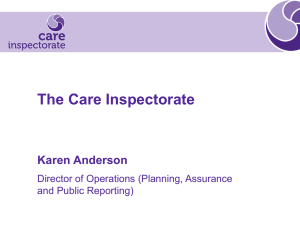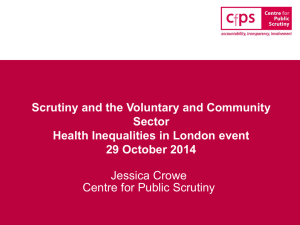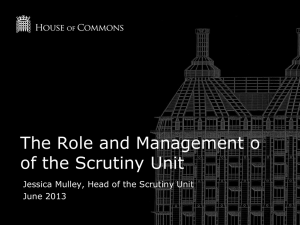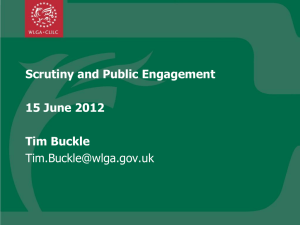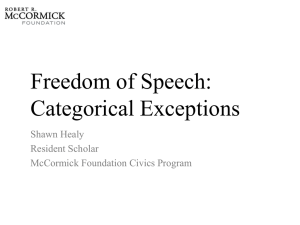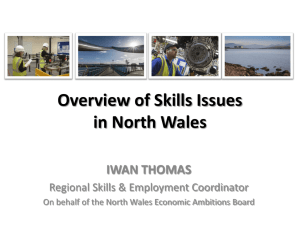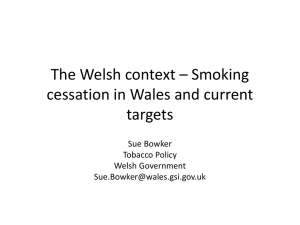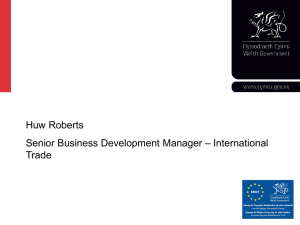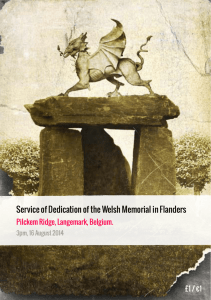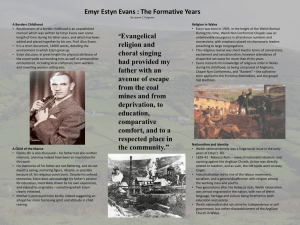Rebecca David-Knight, Wales Scrutiny Programme Manager, CfPS
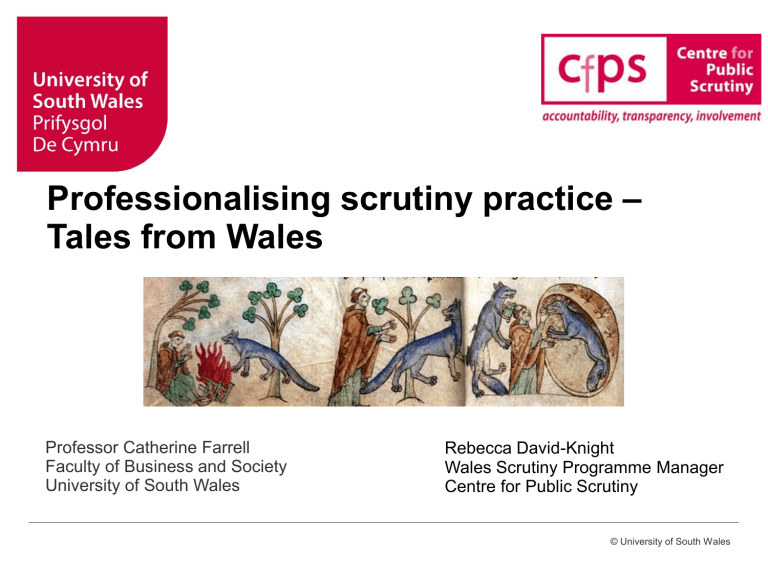
Professionalising scrutiny practice –
Tales from Wales
Professor Catherine Farrell
Faculty of Business and Society
University of South Wales
Rebecca David-Knight
Wales Scrutiny Programme Manager
Centre for Public Scrutiny
© University of South Wales
ackground
• Accountability, simplification and collaboration key and consistent themes in Welsh public service reform since 2010.
• Welsh Government established a Scrutiny Development Fund (SDF) in
2008 to assist innovative practice.
• Independent evaluation of SDF in 2010 identified that fund demonstrated a good return on investment.
• Welsh Government continued to invest in scrutiny – another SDF until
2015 plus flexible programme of scrutiny support from CfPS.
• In addition, Local Government Wales Measure (2011) sets out a range of provisions aimed at strengthening scrutiny function.
The vision for scrutiny in
Wales
A stronger focus on outcomes for people not organisations : shifting the perspective from inputs to delivering results
Enhanced Democratic Accountability and Improved transparency : clarifying different organisations’ contributions to delivery and improving services from the perspective of
‘experts by experience’;
Innovation : multi-agency scrutiny has identified new insights and solutions e.g..subregional procurement opportunities (Aneurin Bevan LHB, Newport and Caerphilly
Councils);
Greater ‘networked accountability ’: Promotion of more efficient working between auditors, inspectors, regulators, and local scrutiny committees;
Multi-agency scrutiny as a unifying force : helping to address the complex needs of citizens across different political, organisational and geographical boundaries.
Scrutiny Officer Development Pilot
Project
• In recognition of the limited training opportunities for Welsh practitioners, Cardiff City Council and University of South Wales secured funding from Welsh Gov. to develop and deliver a pilot project for officers during 2013 - 2014.
Project Aim :
To provide the Scrutiny Officer community with pilot bespoke accredited learning that will assist the delivery of scrutiny in line with
Welsh Government aspirations.
Anticipated benefits
1. Support Scrutiny Officer acquisition of skills and knowledge related to core topics.
2. Build practical links with Universities and providers about the needs of scrutiny officers thus fostering a base form which to develop stronger links.
3. Break down the barriers between L.A.s through working and learning together.
4. Will create a Wales specific development route for scrutiny officers via a formal qualification.
5. Develop an understanding of the collaboration agenda via course content.
6.
Improve Scrutiny Officer’s knowledge of participation, engagement and governance.
What makes up a professional scrutiny officer? 1/3
Previous research suggested the following three domains:
1.
Activities
2.
Skills
3.
Roles
1. Activities
• Working closely with lay scrutineers and understanding what they
'need‘
• Maintaining good relations with lay scrutineers and those who are being scrutinised
• Focusing on the strategic, rather than the procedural, aspects of this work
• Taking responsibility for outputs (usually reports)
What makes up a professional scrutiny officer? 2/3
2. Core skills: someone who :
• Is able to relate to different people
• Understands what they are supposed to achieve
• Can explain complex information in an accessible manner
• Has a thick skin
• Can solve (potential) tensions between different people
What makes up a professional scrutiny officer? 3/3
3. Core roles of a public scrutiny officer
• Research - often facilitating or commissioning rather than actually doing research
• Negotiation and diplomacy - "oiling the wheels“
• Project management
• Relationship-building - most particularly with the committee chair
• Communication - written, oral, communicating complex issues simply
Understanding needs and aspirations of
Welsh scrutiny officers
• National training needs analysis identified need for three modules at post-graduate level to be developed and delivered by USW (with input by partners) during 2013/14.
1.
Political Awareness
2.
Understanding and Challenging public service performance
3.
Governance and scrutiny
• Methods of course delivery also evaluated. Preference for residential element to facilitate collegiate learning environment and high quality relationships.
• Already demonstrating significant positive impact upon environment, impact and practice in tandem with other support initiatives.
Early effects
• Increased confidence , sense of identity and provision of mutual support amongst Welsh scrutiny community.
Development of national ‘characteristics of effective scrutiny’
More collaborative working – e.g. Gwent Scrutiny Challenge
Contribution to national practice guides – e.g. finance scrutiny skills
Better quality of formal and informal networking
Significant increase in take up of CfPS bespoke consultancy support within councils
Development of improved relations with auditors, inspectors and regulators
• Continued reductions in spending and ‘role overload’ key challenges to continued development…
Scrutiny in the age of austerity
Opportunities and Challenges
• Commission on Public Services
Creating a culture of Networked
Accountability in Wales
Commission on Public Services Governance and Delivery (2014)
“Organisations must adopt a ‘best practice’ approach to scrutiny, not a ‘least required’. The scrutiny outcomes and characteristics being prepared by the CfPS must be developed in discussion with other public sector organisations .”
• Characteristics ‘endorsed’ in-principle by Welsh Government’s
National Scrutiny Reference Panel - WAO, Estyn, CSSIW
– Better outcomes
– Better decisions
– Better engagement
• Refinement of characteristics planned for Summer 2014.
Conclusions
• Scrutiny in Wales regarded as important mechanism to strengthen local democracy and improve service delivery within context of local government reorganisation and reduced spending.
• Development of a common performance management framework grounded in practice - owned and championed by scrutiny officers / non-executive chairs
• Scrutiny regarded as ultimate invest to save service in helping ensure alternative delivery models are informed by community intelligence.
• Significance of resources, training and development recognized in scrutiny achieving focus as expectations increase.
• Increasing professionalization, networking and project management key to success
Contact details…
www.cfps.org.uk
- register on-line:
• E-newsletters, e-digests & scrutiny exchange
• Reviews library, on-line forum, latest news
• New Policy and Skills Briefings
• Download publications
Twitter : @CfPSCymru
Email: Rebecca.David-Knight@CfPS.org.uk Wales Scrutiny
Programme Manager
Tel : 07879443410 (mob) 029 2032 9190 (office)
